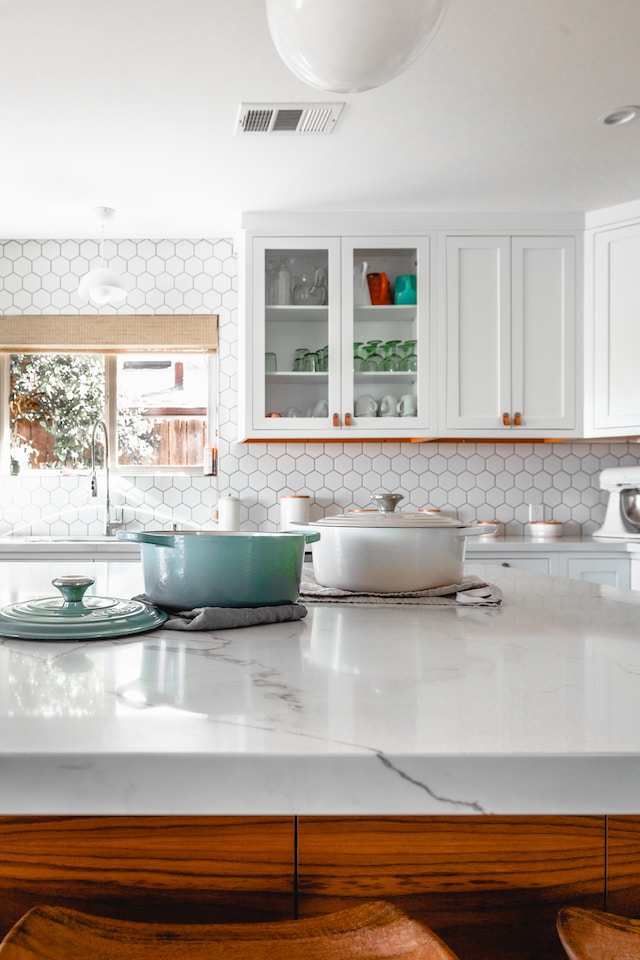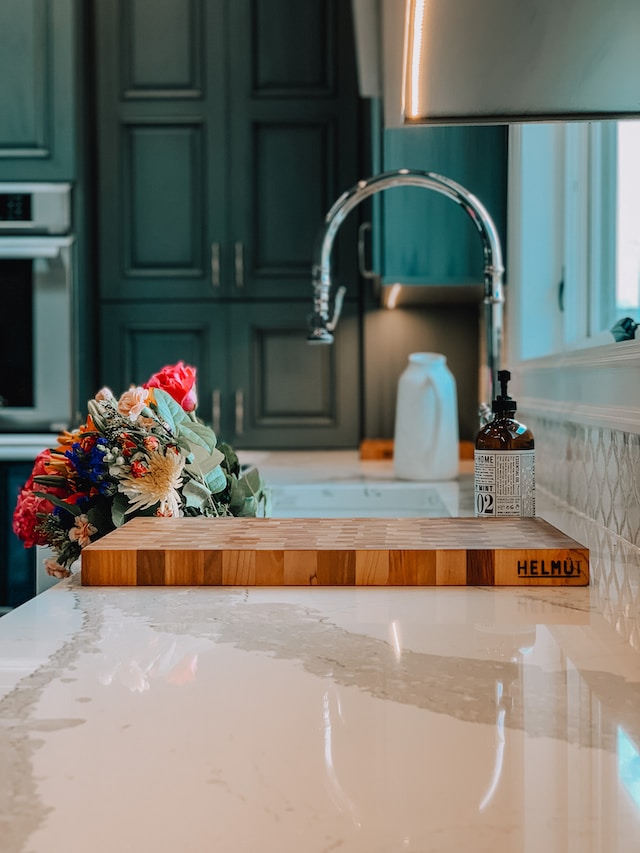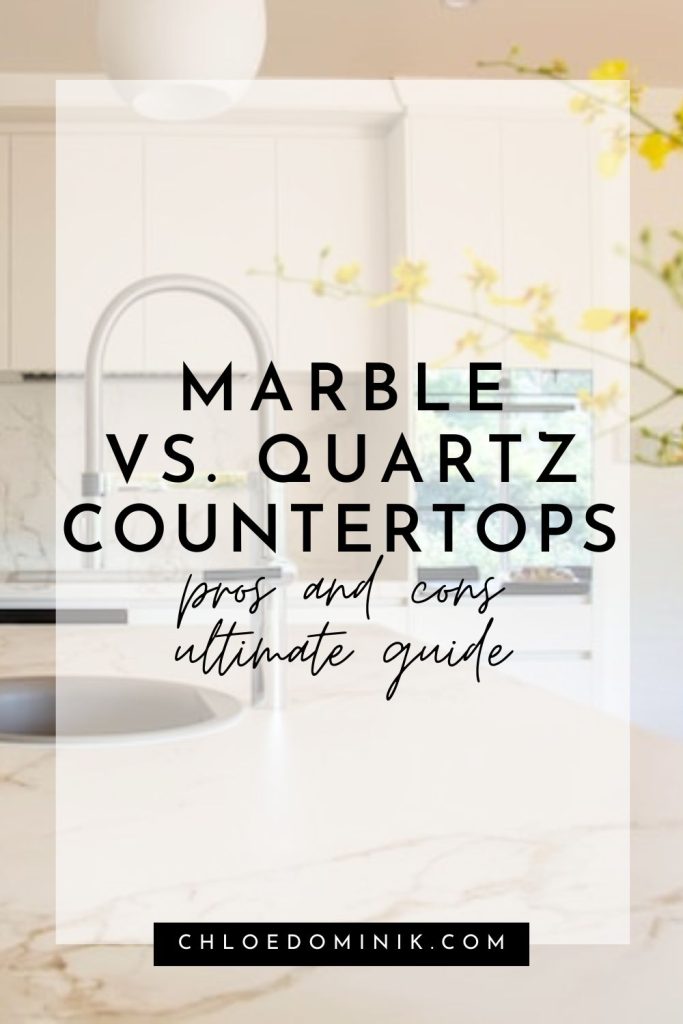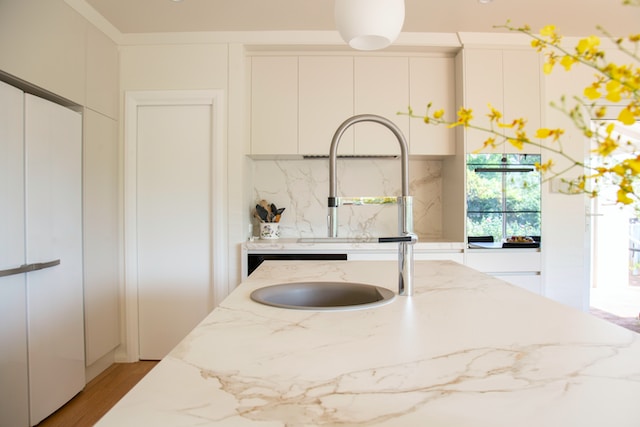Marble vs Quartz Countertops: Pros and Cons Ultimate Guide
Stone is one of the best materials to use in the bathroom and kitchen. One of the most popular options is marble due to it’s beauty and uniqueness. But marble countertops actually come with quite a bit of maintenance.
Quartz is a great alternative to marble and is less prone to everyday uses. And with quartz countertops, you can get a great modern look for less. So which is better marble or quartz countertops?
If you’re thinking of new countertops for your kitchen renovation, both materials offer unique benefits and drawbacks. Both marble and quartz are excellent choices in your home. It just depends on your lifestyle and budget. Also, what is your long-term plans for where you’re living?
Here are the main differences, advantages and disadvantages to consider between the two.
Quartz vs Marble Differences
Marble is a natural stone with a variety of different colors. While quartz is a man-made stone. Made by combining crushed-up particles with binding agents. The main difference between these two materials is marble is a real stone and quartz is a synthetic material.
marble vs quartz countertops

Marble
- Marble: A natural stone formed under extreme conditions.
Marble is a metamorphic rock that originates from limestone that has undergone metamorphism due to intense pressure, heat or both.
This transformation results in the beautiful veining patterns characteristic of natural stone slabs. The color variations depend on the minerals present during its formation, giving each slab a unique appearance. If you don’t want to compromise on the real thing then marble is the choice to go for.
marble countertop Pros
Luxury: Marble countertops are known for their timeless elegance and natural beauty. Homeowners who appreciate the luxurious look of this natural stone often opt for marble despite its higher maintenance requirements.
Natural Stone: For those who value authenticity and one-of-a-kind designs, nothing compares to the allure of real stone countertops. Each slab of marble is unique, with distinct veining patterns that add character to any space.
Variety: Natural marble slabs can be found in an array of different colors and veining. Examples of different marbles include white marble, Calacatta marble and Carerra Marble.
Value: Marble countertops are a great feature if you’re looking to sell your home later down the line and will add its overall value.
Aging: As marble is a natural stone it will get darker (or patina) as the years go by.
marble countertop Cons
Soft Material: Marble is a soft porous material. So it can be prone to chips and cracks.
Care: Marble counters have higher care maintenance, requiring regular sealing to prevent staining and damage from liquids. It is recommended that you seal your marble countertop once a year to maintain its beauty and durability.
Staining: Marble is a softer material. So it’s susceptible to staining from acidic liquids like vinegar, tomato sauce, citrus juices and wine spillages. This is where proper care and resealing are important to minimize staining in the marble countertop as much as possible.
Cost: The price of marble can go a lot higher than quartz per square foot depending on the type of stone and the quality you choose. Marble cost per square foot $60 – $200. Other factors such as location, project size, and labor involved can increase the cost further.
Not sealing your marble countertop every six months may cause irreversible discoloration or etching. However, even with regular sealing, some acidic materials might still penetrate the surface.
Selection: Marble slabs need to be handpicked, selected, inspected and assigned to an area depending on size as no marble slabs vary in pattern it can be difficult to match up patterns in larger areas.
Quartz

- Quartz: Engineered material composed of ground natural quartz combined with resins and pigments.
Quartz counters are created through a controlled manufacturing process that involves mixing crushed-up particles with binding agents. Approximately 90% ground natural quartz with around 10% resins, polymers, and pigments.
These components form an incredibly durable surface known as engineered stone. Quartz offers more durability than even granite without losing luster over time. Pigments can be added during this process to create various colors for homeowners looking for specific hues or designs.
Quartz countertop Pros
- Durability: Quartz is a tough material and non-porous nature due to the presence of resin binders during the manufacturing process.
- Marble Dupe: Quartz slabs mimic the look of marble stone for your countertops and offer different options such as Calacatta quartz making it harder to tell between quartz and marble.
- Consistency: It’s much more consistent in colour and pattern than a natural marble so it’s easier to match up any seams for bigger countertop surfaces.
- Care: Quartz does not require any additional sealant throughout its lifetime. Making it low-maintenance as well as resistant to scratches and other damages that can occur during daily use.
- Low-Maintenance: If practicality is your top priority but you still want an attractive countertop material, quartz counters are good as they require less upkeep. While maintaining an excellent stain-resistant surface and scratch-resistant quality.
- Budget-Friendly: Although both options have varying price points depending on factors such as location or project size, quartz tends to be approximately 25% cheaper on average, making it a more affordable choice for many homeowners. The average cost per square foot is $55 to $200.
Quartz countertop Cons
- Seams: Quartz slabs will have seams when installed for a large countertop surface.
- Labor cost: Quartz countertops are heavier than marble countertops. So the price is likely to increase with the installation and labor cost of quartz countertops.
- Authenticity: Quartz countertops are a great choice but it’s not the real thing.
Quartz Countertops Companies
Here are some of the companies that specialize in quartz countertop options:
Best Cleaning Products for Marble & Quartz Countertops
- Marble Counters: For daily cleaning, use a soft cloth with warm water. Avoid using cleaners with an acidic or abrasive nature, as they can cause damage to the marble surface. Instead, opt for pH-neutral cleaning products specifically designed for marble surfaces.
- Quartz: One of the main advantages of quartz countertops is their low-maintenance nature due to their non-porous surface which requires no additional sealant during its lifetime. To clean quartz countertops, simply wipe them down with a damp cloth and mild soap if needed.
Heat Resistance Qualities
Stone surfaces have great heat resistance properties. This is why they’re a popular option for countertops in the kitchen.
Marble countertops and quartz countertops are heat resistant. While both materials can withstand daily kitchen activities, there are differences in their maximum temperature tolerance levels and how they react to high temperatures.
Marble countertops, being natural stone, can tolerate high temperatures. On the other hand, quartz counters have a higher heat resistance level than marble making them more suitable for kitchens with heavy cooking activity.
However, it’s always recommended that you use trivets or hot pads when placing hot items and pans on any surface. An excessive heat change from cold to hot could cause cracking damage.
Factors Affecting Countertop Pricing
When it comes to the installation process of both marble countertops and quartz counters, professional help is a must. The overall cost of both marble and quartz countertops depends on several factors including:
- Type of Material: With various grades available in each category (e.g., Calacatta Gold vs Carrara Marble), prices can vary significantly based on quality.
- Fabrication & Installation Costs: Professional installation fees vary by region but also play an essential role in determining total expenses.
- Square Footage Needed: The larger the area to be covered, the higher the overall cost will be.
- Edge Profiles: Customized edges such as bullnose, mitered, ogee, or a waterfall edge can add to the final price of your countertop project.
- The Finish: Honed or a polished finish gives a shinier look.
While marble countertops may come with a heftier price tag, but they offer timeless elegance and natural beauty. On the other hand, quartz counters provide durability and customization options at a more budget-friendly rate.
Ultimately, it’s essential to weigh these factors when making your decision based on personal preferences like how often you cook in the kitchen. And what your budget is.
The cost analysis between marble and quartz countertops should be taken into consideration when deciding which material to use in your home.
Summary
It’s important to look at your daily activities in the home and make a decision based on that first.
If you do a lot of cooking and experimenting in the kitchen then quartz countertops are an excellent choice. Quartz is also great if you have kids that like to help out in the kitchen too. The price point is good and you won’t be too precious about keeping your surfaces perfect all the time.
If quality and luxury trump all that for you then marble is a timeless classic. However, choosing either will be a worthwhile investment in your home whether you’re planning to stay or selling to a potential buyer.
I hope this marble vs quartz countertop guide has got you closer to a decision for your home!
Chloe
FAQs Marble vs Quartz countertops
Can You Tell the Difference Between Quartz and Marble?
Nowadays it’s getting harder to tell the difference between synthetic stones and marble as the improvements in quartz materials are always getting better.
Marble is a natural stone with unique veining patterns. While quartz is an engineered material that can mimic the appearance of natural stones but has a more consistent pattern.
What Stains More Marble or Quartz?
Marble tends to stain more easily compared to quartz due to its higher porosity.
Quartz is non-porous and highly resistant to staining, making it less susceptible to spills from liquids like wine or coffee. Regular sealing helps protect marble surfaces from staining.
Which is More Expensive Quartz or Marble?
There’s not much difference in cost for starting prices for quartz $55 and marble $60 average. But depending on the quality of the marble the prices do reach higher per square foot than quartz ranging $200 and more. You’ll be able to find a mid-range price point for quartz and marble depending on what your preferences are.
What’s Better for Countertops: Quartz or Marble?
The choice between quartz and marble depends on personal preferences and intended usage. If you prioritize durability, low maintenance requirements, and heat resistance properties, then quartz countertops are the way to go.
If you prefer natural beauty, and uniqueness in design, and are willing to invest time in maintaining your countertop, then choose marble.







